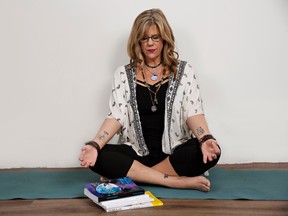SPENCER: What is in your space?

Article content
There have been studies done on our personal spaces and what we have, where we need to declutter, and what is ‘feng shui’ for any space. But today I want us to contemplate more about space. As in, ether.
Ether is the name sometimes used when discussing the element of space. In physics, it’s described as a very rarefied and highly elastic substance formerly believed to permeate all space, including the interstices between the particles of matter, and to be the medium whose vibrations constituted light and other electromagnetic radiation.
Space is everything in the universe beyond the top of the Earth’s atmosphere – the moon, where the GPS satellites orbit, Mars, other stars, the Milky Way, black holes, and distant quasars.
However, space doesn’t exactly do the ether element justice, because it is more than just space. For example, in Ayurvedic studies (traditional Hindu system of medicine), Ether is the source, the original element, from which all the other elements, Air, Fire, Water and Earth are formed.
This same element was studied by ancient philosophers like Aristotle, who called this element Aether or “Quintessence.” Aristotle, born 322 BCE, was an ancient Greek philosopher and scientist, one of the greatest intellectual figures of Western history. He was the author of a philosophical and scientific system that became the framework and vehicle for both Christian scholasticism and medieval Islamic philosophy. Even after the intellectual revolutions of the Renaissance, the Reformation, and the Enlightenment, Aristotelian concepts remained embedded in Western thinking.
The definition of quintessence simply was ‘spirit.’ In classical and medieval philosophy, this fifth substance in addition to the four elements, was thought to compose the heavenly bodies and to be latent in all things (Ethos, meaning “custom” or “character” in Greek.) As originally used by Aristotle, it referred to a man’s character or personality, especially in its balance between passion and caution.
The ancients believed that ether embodied the space between the heavens and earth. The Greeks believed Ether was what the Gods breathed. It was the source of life.
It has been called a subtle element as you cannot feel its profound presence yet it is present everywhere. This element has no boundaries and thus forms a part of all the other elements.
Ether is everywhere there is a space. In your lungs after you have emptied after the exhale, in your nasal cavities and sinuses, in the space of your bladder, stomach and uterus. It is in your ears and throat.
In yogic philosophy, it is believed you can experience the Ether element during meditation, tapping into the space between your ears! When your mind is troubled, it’s like a whirlpool. The Sanskrit word for that is Vritti. One of the fundamental goals of your yoga practice is to calm those Vrittis or those whirlpools. Mindfulness throughout the day can assist to process the day as it happens. Rather than trying to do it at night when you are tired and your head hits the pillow and all of the sudden you can’t stop thinking about everything that has happened already or perhaps worrying about things in the future that have not even occurred yet.
The goal of mindfulness and meditation is to return to Samahdi. In yoga, often people think that the yoga poses we do are what yoga is, however yoga is composed of the eight limbs of yoga and the poses are only one of them. Samadhi is also a limb and this is the calm and peaceful state of mind that brings us tranquility, serenity and enlightenment.
Ether is also the element associated with wheel of energy at the throat and ears level. The Sanskrit name is “Vishudda,” which means “pure” or “purification.”
We can balance the element of ether personally by paying mindful attention to the space around us. What we are putting in the space by consciously using our voice and choosing the words we are speaking.
“Is it true; is it kind, or is it necessary?” asked Socrates.
If you propose to speak, we should aim to have our speech be true, kind, helpful, and conducive to harmony. Be mindful of words that create more divisiveness, untruths, gossip or hurtful.
Communication is a two-way street. Therefore, we must also be examining the space which we allow in our ears. What conversations are you listening to and participating in, what information are you allowing in and is it true, kind and necessary?
As we understand the healing properties of the elements, we can tap into the earth element to ground us, the water element to cleanse and go with the flow, the fire element to find empowerment, the air element to find balance, love and lightness, and the ether element to expand enlightenment, tranquility and peace.
Postmedia is committed to maintaining a lively but civil forum for discussion. Please keep comments relevant and respectful. Comments may take up to an hour to appear on the site. You will receive an email if there is a reply to your comment, an update to a thread you follow or if a user you follow comments. Visit our Community Guidelines for more information.